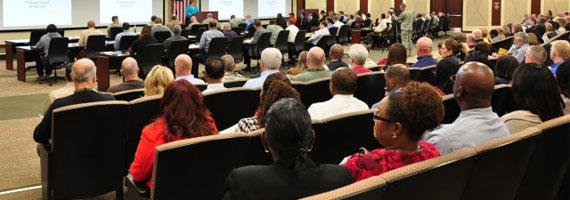A series of town hall meetings advertised as a means of hearing from families users as part of Defense Sec. Chuck Hagel's 90-day military health care system review may feel more like pro-forma events with very little chance for actual concerns to be heard, advocates worry. That's because attendees could not be told how the information will be used, said military spouses who went to the most recent event at Fort Belvoir, Va.
Military health care advocates were surprised late last week to find that four of the seven town hall meeting to be held worldwide had already taken place. Advertisement of the events was left up to the local installation where they were held, Defense Department officials said. The location but no date or time information was also posted to Health.mil.
But at least some of the advertising appears to not have been done very well. Not a single person showed up for the event in San Diego, Calif., according to sources, and the event may be rescheduled.
According to officials with the Defense Department the town hall meetings are meant to give military health care users a chance to air concerns. They are to be an open discussion where the team can solicit community feedback, they said.
The meetings are facilitated by a team of about 20, according to DoD officials. The base commander and local military hospital command teams do not attend the meetings so that people feel comfortable talking, they said.
At Belvoir attendees were given the chance to bring up questions and issues, but received no answers from those running the meeting. More like a listening session than a town hall meeting, they said, the organizers simply took notes on their concerns and asked questions of their own to the audience.
But when asked what the information will be used for, they were unable to give an answer.
"You don't have any idea what they do with the information - how would you know one way or another what happens with it? There's no way to know," said Jeremy Hilton, a military healthcare advocate and Air Force spouse.
"There were no guidelines set forth as to what the outcomes of this are going to be ... they didn't indicate what is going to be taken from the meeting and used," a source, who didn't wish her name to be used, said. "The only thing indicated is that someone was taking notes and there shouldn't be anyone in the meeting who was a journalist."
The participants we spoke with said the meeting, which was held in the middle of a workday, was mostly attended by retirees -- likely because others couldn't come or didn't know about it. The problem with that, they said, is that retirees have a very different perspective on military healthcare as active duty families, particularly those with small children.
"If I had been in there with absolutely zero knowledge of the military health care system I would've walked out and said 'huh, things aren't so bad,'" our source said. "All of the active duty families that were in there, none of what they said was positive. All of it centered around behavioral health, access to appointments.
"The majority of the time was long winded answers from retirees ... I'd say about 60 percent of the answers were a pat on the back, 'good job'" from retirees.
The Fort Belvoir meeting was attended by about 150 people, DoD officials said. The previous four meetings were held throughout the U.S.
About 200 people attended the meeting at Madigan Army Medical Center at Joint Base Lewis-McChord, Wa. The meeting at the Air Force Academy, Co. was attended by about 50. And about 80 came to the For Stewart meeting.
A town hall Patuxent River, Md. was held July 1. Numbers were not immediately available. A meeting at Lakenheath, U.K. is scheduled for July 7. The San Diego meeting, which no one attended, is still in the process of being rescheduled.
Spouses and advocates said that for the town hall meetings to be successful the organizers should be focusing on listening to concerns not just about the local military treatment facility, but the system as a whole. And unless the community's answers are going to make a real impact, the whole thing is pointless, they said.
DoD officials did not respond to inquires as to how the information collected during the town hall meetings will be used.









